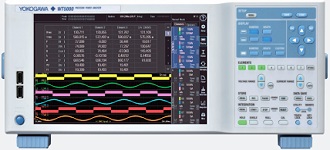Axiom Test Equipment Blog:
|

Press Release Archives: 2024 | 2023 | 2022 | 2021 |2020 2019 | 2018 | 2017 | 2016 | 2015 2014 | 2013 | 2012 | 2011 | 2010 2009 | 2008 | 2007 | 2006 | 2005 Content is copyright of company represented. Page format, custom text and images are RF Cafe copyright - do not distribute.
Yokogawa WT5000 is the world's most accurate precision power analyzer with a basic power accuracy of ±0.03%. Axiom Test Equipment image. July 6, 2022 - Vista, California - Axiom Test Equipment, Inc., an electronic test equipment rental and sales company has published a new blog post entitled "Learn When an Analyzer Makes More Sense Than a Meter," that helps identify when it's better to pick an analyzer or a meter unit, based on the requirements you have. Some test units, like meters, are designed for speed and simplicity and to read a single electrical parameter, such as voltage, current, or power. Other test units are more elaborate and are called analyzers because they not only gauge the value of an electrical parameter, but they also enable full study of it. However, both types of units have grown in power and sophistication and today's comparisons require a bit more time and thought. Meters and analyzers may appear remarkably similar at first, starting with the measurement of an electrical parameter such as voltage, current, or power. Both types of units work with probes, sensors, or test fixtures to determine the value of an electrical parameter for a device under test (DUT). The meter usually gives a quick measurement, often a "one-button test," while the analyzer may require more programming and setup time. But the time invested up front can lead to more details about the test results, such as not just an AC or DC voltage but how it varies with time, temperature, frequency, and change of load. When such additional information about a measured electrical parameter is needed, the tendency is to reach for an analyzer rather than a meter. The requirements of a test application will usually determine whether a meter can provide optimum test results or if the greater capabilities of an analyzer are needed. Learn more by reading the full blog post on Axiom's Website: https://www.axiomtest.com/blog/Learn-When-an-Analyzer-Makes-More-Sense-Than-a-Meter/ Whatever your project requires testing on, you can rent or buy quality test equipment from Axiom Test Equipment. For over 15 years Axiom Test Equipment has rented, sold, repaired and accepted trade-in of test equipment to support your test & measurement needs. If you would like help selecting any type of test equipment for your next project, contact Axiom Test Equipment's sales department at sales@axiomtest.com, call 760-806-6600, or browse Axiom Test Equipment's inventory online at www.axiomtest.com.
Whatever your project requires testing of, rent or buy quality test equipment from Axiom Test Equipment. For over 15 years Axiom Test Equipment has rented, sold, repaired and accepted trade-in of test equipment to support your test & measurement needs. If you would like help selecting any type of test equipment for your next project, contact Axiom Test Equipment's sales department at sales@axiomtest.com, call 760-806-6600, or browse Axiom Test Equipment's inventory online at www.axiomtest.com. For any further questions or requirements, contact Axiom Test Equipment at sales@axiomtest.com, call 760-806-6600, or visit Axiom Test Equipment online at www.axiomtest.com.
About Axiom Test Equipment
Established in 2005, Axiom Test Equipment strives to continually improve itself and offer the best value for its customers. We offer our customers several practical, efficient and cost effective solutions for their business or projects' test equipment needs. Whether you need to rent & buy test equipment, repair test equipment, sell or trade equipment, we are committed to providing superior customer service and high quality electronic test equipment. At Axiom Test Equipment we provide several services. We rent electronic test and measurement equipment. We also sell test equipment. If you have a piece of malfunctioning or broken test equipment we also have an in-house repair lab. For anyone seeking a way to offload their surplus or obsolete equipment, we offer a trade-in program or we can buy the equipment from you. We stock a comprehensive inventory of equipment and can use our extensive network to find you those hard to get items. We believe in getting equipment to you quickly and at a competitive price.
Contacts Fabian Garcia Web: www.axiomtest.com E-Mail: fgarcia@axiomtest.com
Posted July 7, 2022 |


 Get Exactly What You Need. Rent - Buy
- Repair - Trade-In
Get Exactly What You Need. Rent - Buy
- Repair - Trade-In